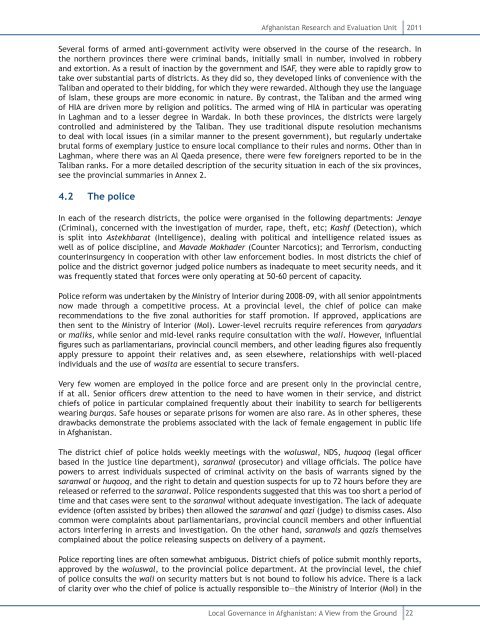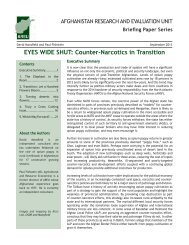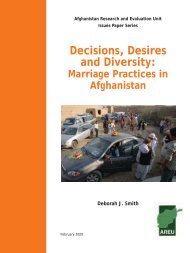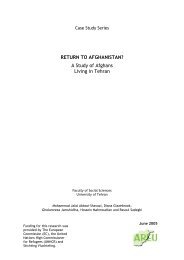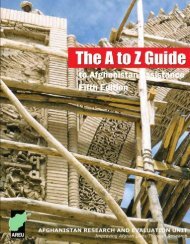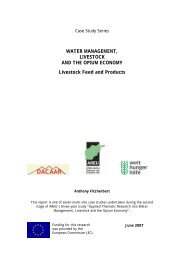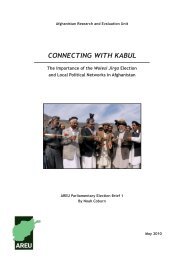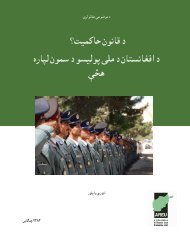Local Governance in Afghanistan: A View from the Ground
Local Governance in Afghanistan: A View from the Ground
Local Governance in Afghanistan: A View from the Ground
- No tags were found...
Create successful ePaper yourself
Turn your PDF publications into a flip-book with our unique Google optimized e-Paper software.
<strong>Afghanistan</strong> Research and Evaluation Unit<br />
2011<br />
Several forms of armed anti-government activity were observed <strong>in</strong> <strong>the</strong> course of <strong>the</strong> research. In<br />
<strong>the</strong> nor<strong>the</strong>rn prov<strong>in</strong>ces <strong>the</strong>re were crim<strong>in</strong>al bands, <strong>in</strong>itially small <strong>in</strong> number, <strong>in</strong>volved <strong>in</strong> robbery<br />
and extortion. As a result of <strong>in</strong>action by <strong>the</strong> government and ISAF, <strong>the</strong>y were able to rapidly grow to<br />
take over substantial parts of districts. As <strong>the</strong>y did so, <strong>the</strong>y developed l<strong>in</strong>ks of convenience with <strong>the</strong><br />
Taliban and operated to <strong>the</strong>ir bidd<strong>in</strong>g, for which <strong>the</strong>y were rewarded. Although <strong>the</strong>y use <strong>the</strong> language<br />
of Islam, <strong>the</strong>se groups are more economic <strong>in</strong> nature. By contrast, <strong>the</strong> Taliban and <strong>the</strong> armed w<strong>in</strong>g<br />
of HIA are driven more by religion and politics. The armed w<strong>in</strong>g of HIA <strong>in</strong> particular was operat<strong>in</strong>g<br />
<strong>in</strong> Laghman and to a lesser degree <strong>in</strong> Wardak. In both <strong>the</strong>se prov<strong>in</strong>ces, <strong>the</strong> districts were largely<br />
controlled and adm<strong>in</strong>istered by <strong>the</strong> Taliban. They use traditional dispute resolution mechanisms<br />
to deal with local issues (<strong>in</strong> a similar manner to <strong>the</strong> present government), but regularly undertake<br />
brutal forms of exemplary justice to ensure local compliance to <strong>the</strong>ir rules and norms. O<strong>the</strong>r than <strong>in</strong><br />
Laghman, where <strong>the</strong>re was an Al Qaeda presence, <strong>the</strong>re were few foreigners reported to be <strong>in</strong> <strong>the</strong><br />
Taliban ranks. For a more detailed description of <strong>the</strong> security situation <strong>in</strong> each of <strong>the</strong> six prov<strong>in</strong>ces,<br />
see <strong>the</strong> prov<strong>in</strong>cial summaries <strong>in</strong> Annex 2.<br />
4.2 The police<br />
In each of <strong>the</strong> research districts, <strong>the</strong> police were organised <strong>in</strong> <strong>the</strong> follow<strong>in</strong>g departments: Jenaye<br />
(Crim<strong>in</strong>al), concerned with <strong>the</strong> <strong>in</strong>vestigation of murder, rape, <strong>the</strong>ft, etc; Kashf (Detection), which<br />
is split <strong>in</strong>to Astekhbarat (Intelligence), deal<strong>in</strong>g with political and <strong>in</strong>telligence related issues as<br />
well as of police discipl<strong>in</strong>e, and Mavade Mokhader (Counter Narcotics); and Terrorism, conduct<strong>in</strong>g<br />
counter<strong>in</strong>surgency <strong>in</strong> cooperation with o<strong>the</strong>r law enforcement bodies. In most districts <strong>the</strong> chief of<br />
police and <strong>the</strong> district governor judged police numbers as <strong>in</strong>adequate to meet security needs, and it<br />
was frequently stated that forces were only operat<strong>in</strong>g at 50-60 percent of capacity.<br />
Police reform was undertaken by <strong>the</strong> M<strong>in</strong>istry of Interior dur<strong>in</strong>g 2008-09, with all senior appo<strong>in</strong>tments<br />
now made through a competitive process. At a prov<strong>in</strong>cial level, <strong>the</strong> chief of police can make<br />
recommendations to <strong>the</strong> five zonal authorities for staff promotion. If approved, applications are<br />
<strong>the</strong>n sent to <strong>the</strong> M<strong>in</strong>istry of Interior (MoI). Lower-level recruits require references <strong>from</strong> qaryadars<br />
or maliks, while senior and mid-level ranks require consultation with <strong>the</strong> wali. However, <strong>in</strong>fluential<br />
figures such as parliamentarians, prov<strong>in</strong>cial council members, and o<strong>the</strong>r lead<strong>in</strong>g figures also frequently<br />
apply pressure to appo<strong>in</strong>t <strong>the</strong>ir relatives and, as seen elsewhere, relationships with well-placed<br />
<strong>in</strong>dividuals and <strong>the</strong> use of wasita are essential to secure transfers.<br />
Very few women are employed <strong>in</strong> <strong>the</strong> police force and are present only <strong>in</strong> <strong>the</strong> prov<strong>in</strong>cial centre,<br />
if at all. Senior officers drew attention to <strong>the</strong> need to have women <strong>in</strong> <strong>the</strong>ir service, and district<br />
chiefs of police <strong>in</strong> particular compla<strong>in</strong>ed frequently about <strong>the</strong>ir <strong>in</strong>ability to search for belligerents<br />
wear<strong>in</strong>g burqas. Safe houses or separate prisons for women are also rare. As <strong>in</strong> o<strong>the</strong>r spheres, <strong>the</strong>se<br />
drawbacks demonstrate <strong>the</strong> problems associated with <strong>the</strong> lack of female engagement <strong>in</strong> public life<br />
<strong>in</strong> <strong>Afghanistan</strong>.<br />
The district chief of police holds weekly meet<strong>in</strong>gs with <strong>the</strong> woluswal, NDS, huqooq (legal officer<br />
based <strong>in</strong> <strong>the</strong> justice l<strong>in</strong>e department), saranwal (prosecutor) and village officials. The police have<br />
powers to arrest <strong>in</strong>dividuals suspected of crim<strong>in</strong>al activity on <strong>the</strong> basis of warrants signed by <strong>the</strong><br />
saranwal or huqooq, and <strong>the</strong> right to deta<strong>in</strong> and question suspects for up to 72 hours before <strong>the</strong>y are<br />
released or referred to <strong>the</strong> saranwal. Police respondents suggested that this was too short a period of<br />
time and that cases were sent to <strong>the</strong> saranwal without adequate <strong>in</strong>vestigation. The lack of adequate<br />
evidence (often assisted by bribes) <strong>the</strong>n allowed <strong>the</strong> saranwal and qazi (judge) to dismiss cases. Also<br />
common were compla<strong>in</strong>ts about parliamentarians, prov<strong>in</strong>cial council members and o<strong>the</strong>r <strong>in</strong>fluential<br />
actors <strong>in</strong>terfer<strong>in</strong>g <strong>in</strong> arrests and <strong>in</strong>vestigation. On <strong>the</strong> o<strong>the</strong>r hand, saranwals and qazis <strong>the</strong>mselves<br />
compla<strong>in</strong>ed about <strong>the</strong> police releas<strong>in</strong>g suspects on delivery of a payment.<br />
Police report<strong>in</strong>g l<strong>in</strong>es are often somewhat ambiguous. District chiefs of police submit monthly reports,<br />
approved by <strong>the</strong> woluswal, to <strong>the</strong> prov<strong>in</strong>cial police department. At <strong>the</strong> prov<strong>in</strong>cial level, <strong>the</strong> chief<br />
of police consults <strong>the</strong> wali on security matters but is not bound to follow his advice. There is a lack<br />
of clarity over who <strong>the</strong> chief of police is actually responsible to—<strong>the</strong> M<strong>in</strong>istry of Interior (MoI) <strong>in</strong> <strong>the</strong><br />
<strong>Local</strong> <strong>Governance</strong> <strong>in</strong> <strong>Afghanistan</strong>: A <strong>View</strong> <strong>from</strong> <strong>the</strong> <strong>Ground</strong><br />
22


